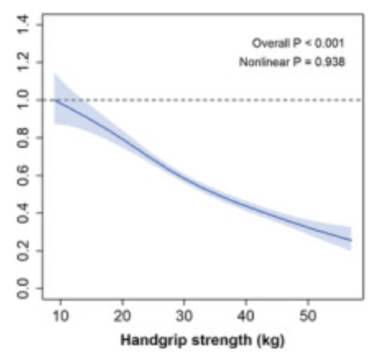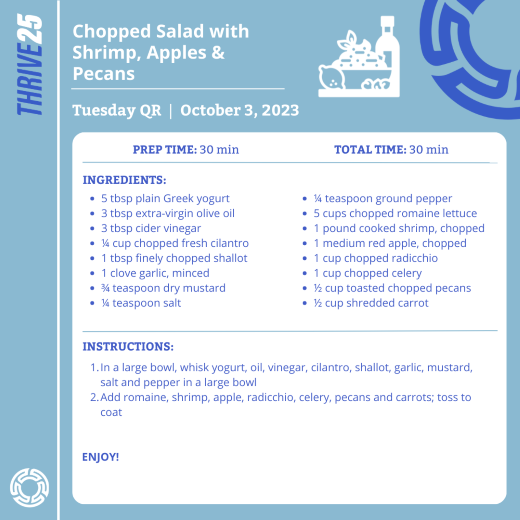Issue #247: Alzheimer's Prevention Plan
Good morning. It’s Tuesday, October 3rd.
Today’s Quick Win
From the Lab: Alzheimer’s Prevention Plan
Speed Read: A New Blue Zone?
Tuesday QR: Chopped Salad with Shrimp, Apples & Pecans
“To keep the body in good health is a duty, otherwise we will not be able to keep our mind strong and clear.”
Our brain is only 2 percent of our bodyweight, but uses 20% of the metabolic energy we produce. (Source)
From the Lab
We fear Alzheimer’s Disease (AD) more than cancer, stroke and heart disease combined.
On the one hand, this makes total sense - losing our mental capacity to live on our own or forgetting who we are and the people around us is scary as hell.
On the other hand though, 48% of Americans think they will develop dementia. While the number is going up - today that number is closer to 13%.
What can we do to prevent getting AD and keep it from taking over our life?
Genes do impact our chances of getting Alzheimer’s Disease. Most notably the ApoE gene. We get these genes from both parents and if both are the E4 allele (compared to E2 and E3), this significantly increases the risk of AD.
This was what Peter Attia communicated to Chris Hemsworth on the show Limitless.
Scientists used to believe that amyloid plaque on the brain caused dementia. But based on new research, this is most likely an outcome, not a cause of brain disease.
It now seems that the disease takes root when the brain can’t access sufficient blood flow and glucose (fuel). Basically our brain health is based on our metabolism - just like our heart health and the rest of our body.
That’s why the E4 gene is so closely tied with AD. It makes moving cholesterol in/out of the brain more difficult and thus hurts the ability for the brain to get sufficient energy. Fortunately, only 2-5% of the population have this gene combination.
90% of all cases of AD are not inherited - they’re from metabolic disease. People with Type 2 Diabetes are 2-3x more likely to get AD.
This is actually a good thing - it means there’s now more proof than ever that the majority of us can prevent the onset of AD and retain cognitive function later in life.
(Know Your) Biomarkers
Metabolic health functions by taking in the right fuel and turning that into energy. This means you’ve got to track the Top 8 Metabolic Tests - including blood pressure, lipoproteins, waist circumference/body fat %*, blood glucose and insulin.
*According to Dr. Peter Attia - a bigger belly = a smaller hippocampus (memory center of the brain)
Resistance Training
A UK study showed that people in the lowest quartile (25%) of Grip Strength had a 72% higher incidence of dementia, compared to the top quartile.
Never stop strength training!!*
*Exercise is just as important - too much sitting crushes our brain health.
Always Be Learning
There’s such a thing as “cognitive reserve.” The more you put it to work and the more networks and neural connections, the more you have resistance against mental decline. Research shows that it’s not just doing the same thing over and over again (e.g., Wordle), but learning completely new and complex skills - like a new language or musical instrument.
*That’s why we mix up our Brain Teasers in every Saturday issue. 🙂
Internalize Sleep, Not Stress
Deep sleep is all about restoring the brain.
“Think of deep sleep almost like a life raft that keeps memory afloat, rather than memory getting dragged down by the weight of Alzheimer’s disease pathology.”
Too much stress (i.e., cortisol) not only impairs our sleep - but also impairs hormones that need to be in balance for good brain health. So get outside in nature, do some cyclic sighing (more powerful than meditating), and don’t keep going 24/7 until you hit a point of burnout.
(Get Your) Nutrients
Healthy food = Healthy Brain.
B vitamins lower homocysteine (inflammation) - eat your eggs and leafy greens
Omega-3 is real brain food - just make sure you get a reputable brand
Vitamin D is associated with a better memory
Blueberries seem to have a special power to protect our brain
BONUS: Floss your teeth
There seems to be a correlation between gingivitis and AD. Bloody gums might not be a cause of AD - but it’s an easy win just in case.
Thrive25 Partner Spotlight
Magnesium is a master mineral - we covered the benefits of Magnesium in Issue #21. The only form that gets into the brain is Magnesium Threonate (MgT).
The Momentous Magnesium Threonate supplement is clinically proven to improve cognitive function and enhance the quality of sleep (see video from Dr. Andrew Huberman at minute 2:19). So it’s become part of my personal supplement routine.
Thrive25 subscribers get 15% off the entire product portfolio using code Thrive at checkout. Click HERE!
Speed Read
Health & Longevity in the News
A New Blue Zone?: There’s some dispute if the five identified regions have actual data, on quality of life and number of people living over 100, that clearly differentiates them from neighboring regions. However, there may be a new Blue Zone forming in one of the most progressive countries in the world. (Salon)
Jimmy Carter Turns 99: President Carter went into hospice care 7 months ago, but the former president continues to live on. He embodies much of what it takes for real longevity - a sense of purpose, family connection, exercise and spirituality. (Today)
Healthspan over Lifespan: The average American can expect one (1) healthy year after the age of 65. Instead of worrying about how long we live, let’s focus on how to be healthy until we die. (NYTimes)
Tuesday QR | Chopped Salad with Shrimp, Apples & Pecans
Enjoy a symphony of flavors from this chopped salad. Experience the sweet, crisp bite of apples harmonizing with the refreshing crunch of celery. Elevate your palate as savory shrimp takes center stage, complemented by the rich, nutty notes of pecans. This vibrant and easy-to-make dinner salad promises a medley of tastes and textures that will leave your taste buds singing for more.
Thanks for joining us today!
Check out the latest workout videos on our YouTube channel
Got feedback, recommendations or stories to share? Tell us what’s on your mind here
Want this direct to your inbox? Sign up here
Why Thrive25
We’re 40-something dads that felt our bodies and minds start to slow down and we’re not ready for that. We found too much information on every subject. So we started Thrive25 to transform what we’ve learned into something useful for the rest of us to spend just 3-5 min a day to optimize our health & longevity.
This newsletter is for you and we truly value your feedback. Never hesitate to reach out to us at team@thrive25.com.
To health!
Sign up for free:
The information in this newsletter is for informational purposes only and may not be appropriate or applicable based on your individual circumstances. Thrive25, Inc. does not provide medical, professional, or licensed advice. Please connect with your healthcare professional for medical advice specific to your health needs.












